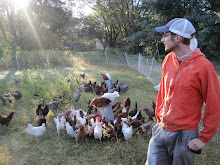Visions of lead coated beanie babies, killer cat food, and depleted uranium childrens candy came to mind.
I had seen this before and thought to myself that I needed to investigate further but I didn't until tonight.
My initial uneducated reaction is: This has to be REALLY fishy. How can a USDA Organic certification be enforced in not only a foreign country - but one with an atrocious environmental record and an closed and authoritarian government?
It turns out that my initial jump to conclusions was pretty much right.
After some serious digging I found a USDA Economic Research Service report titled "Imports from China and Food Safety."
Here is the main meat on how food is certified organic, its a little long and jargony but interesting. The main thrust is that the vast majority of inspection is done by a Chinese-government affiliated organization and that their are only a handful of third party inspectors. In any case, information is closely held by the Chinese government so it is impossible to know whether the standards are being followed or not.
In China, certifications and lab tests are performed mainly by government or government-affiliated organizations (Ye). Domestic “pollution-free” and “QS” certifications are performed by organizations affiliated with provincial agricultural or technical supervision bureaus. The sanitation certification for exporters is conducted by a team of provincial CIQ auditors, and products are
tested by CIQ. Only a few private-sector certifiers and labs have been accredited to work in China. HACCP certification for Chinese exporters is performed by provincial quarantine bureaus. CQC, China’s largest certification agency, also performs HACCP certifications, as well as organic, GAP, ISO 9000, and
other certif cations. CQC is nominally an independent entity but was a branch of AQSIQ until 2002. Wang and Ren concluded that water quality testing in China was beset by technical problems, funding and manpower shortages, and selective testing or manipulation of data by officials. Both overseas and domestic consumers might have greater confidence in Chinese food products if a wider range of certifiers and labs were given greater latitude to operate in China. Overseas consumers might have more confidence in government-sponsored tests and certifications if their results could be verified by private-sector third parties.
More on the Chinese government witholding information.
Alright, so if Chinese food imports are unsafe, wouldn't they be stopped at the border by our vigilant USDA inspectors? Well not really...
The general level of food safety in China seems to be improving, but it is difficult to assess the seriousness of problems or the degree of progress since information is closely guarded by the Chinese Government.
FDA inspects less than 1 percent of food shipments
destined for the United States, and it performs laboratory examinations on an even smaller percentage of shipments. The refusal data do not include consistent measures of the value or volume of an entry line so we cannot calculate the value or share of food imports refused.
But when they do inspect:
Unsafe pesticide residues were found on some vegetables and their products: celery, soybeans, lotus, pea pods, mushrooms, scallions, ginger, and ginseng. Several shipments of purportedly organic beans and berries were refused for unsafe pesticide residues. A number of shipments of eels were also contaminated with pesticides.
What I take away from all of this is that it doesn't seem like a great idea for any country to be importing a significant amount of its food and that as a consumer you best bet is to know where your food comes from. Buying organic from across the planet or California when you live in Georgia is kind of missing the point.
And if you're wondering, my mom returned the veggies.
Elliott


I sorted through my son's Halloween candy --not in search of urban legend pins and needles, but Chinese candy. Thanks for the post: I will be examining my bags of frozen peas more closely in future and, of course, continuing to buy as many veggies as possible from true and local organic farmers like Walker Farms.
ReplyDelete